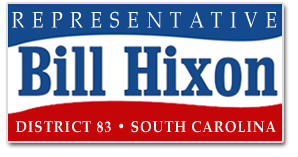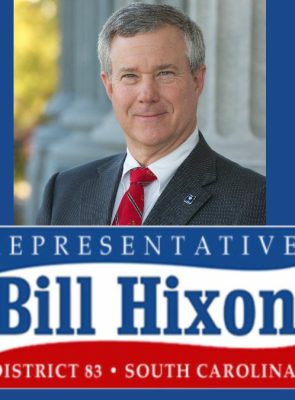Dear Friends,
With two weeks off in the Legislative session a lot was completed before we dismissed. We took additional steps to combat human trafficking, passed a reform measure to assist the ride-sharing industry, and consolidated road improvement and tax reform proposals.
My proposed legislation, H.3799, for the concealed weapon permit reciprocity between South Carolina, Georgia and North Carolina passed out of the subcommittee with a vote of 4-0. This bill is now headed to the full committee and then to the House floor.
Last week I received several phone calls about the gas tax legislation. In summary there are several parts to this bill:
- Restructuring Part 1: Department of Transportation (DOT)
- Governor Haley will appoint all Highway Commissioners with Joint Transportation Review Committee (JTRC) screening
- Commission will appoint a Secretary with advice and consent of Senate
- Commissioners serve at pleasure of the Governor.
- No terms, may serve up to a maximum, combined 12 years. And this is retroactive.
- Restructuring Part 2: State Infrastructure Bank (SIB)
- SIB expanded from 7 to 13 members: 7 district Highway Commissioners, 3 House Speaker appointments and 3 Senate President appointments: 1 of each is ex officio Representative/Senator
- At least one of each of the two non-legislator appointments made by Senate President/House Speaker must be from a "distressed or least developed" area, just like Rural Infrastructure Authority Members
- No terms for board members – may serve up to a maximum, combined 12 years. And this is retroactive
- $25 million project minimum as opposed to current policy of $100 million.
- Must follow prioritization criteria set by SCDOT with Act 114.
- A Joint Resolution can override prioritization criteria requirement-single project only.
- Transfer of Local Routes as identified by SC DOT
- Voluntary participation for local governments – participants receive additional County Transportation Funds (C-Funds).
- Phased in with 3 parts, increased funds and road transfers in each phase
- SCDOT identifies roads for transfer. Local governments choose 1/3 of the roads identified to take by Jan. 1, 2016, another 1/3 of 1/1/2018 and the final 1/3 of 1/1/2020.
- If participants do not inform SCDOT of which 1/3 of their roads they would like to take, SC DOT will make that decision on Nov.1.
- C-Funds increased for participants in first year by $1 Million, $500,000 for those who opt-out in first year, but choose to start participation gin the second phase, and finally $250,000 for those who choose to participate in the third phase or any time thereafter. Those participating in phase one and phase two will see additional C-Fund allocation increases (above the $1 million in $500,000) in subsequent phases.
- C-Fund revenues will increase from 2.66 cents/gallon to 4 cents/gallon in year one, 5 cents/gallon in 2018, and 6 cents/gallon in 2020. Requirement that 25% of C-funds be spent on state roads is removed, and in turn, $25 million is set aside to proved each county with an equal amount (approximately $540,000 a year) to be spent solely on state owned roads.
- Only participants will seen an increase in C-Fund allocations. Additional funds will be deposited into DOT's main highway account for counties choosing not to participate.
- Funding
- Adding an Excise Tax equivalent to the state sales tax (6%)- this is equal to the removal of the sales tax exemption. Using two 6 month base periods, the penny amount of the tax will be set using an average of the wholesale price from the base period, to set the tax amount for the following 6 months. This is very similar to the 2012 TRAC recommendations.
- The intent is to create a moving component to the revenue base, with a diversified gas tax that reacts to the market with controls (capped at a change of no more than 2 cents a year to limit volatility in the tax when oil prices fluctuate dramatically.)
- Drops the flat motor fuel user fee from 16.75 to 10.75/gallon and adds a 6% excise tax on motor fuels. Maximum combine gas tax of no more than 26.75 cents/gallon.
- Estimated average impact per passenger vehicle is $50 a year. (22 MPG/11,000 miles a year)
- All the Auto-sales tax revenues dedicated to the NFA Highway Fund go to the State Highway Fund.
- Auto Sales tax increase from $300 to $500. Hold EIA harmless, send all other revenue from sales tax to Highway Fund -total estimate of $170 million.
- Fiscal impact of H.3579 (ad Hoc Bill) is $427 million in total new revenue for Fiscal Year 2015-2016.
- The bill also provides for a moratorium on any new construction until 2020 with certain exceptions.
- Following the House passed version of the Fiscal Year 2015 -2016 Appropriations Bill, $50 million of the Auto sales tax transferred from the General Fund to the SCDOT will be used to service bonds through the SIB, as done in Fiscal Year 2013-2014 with Act 98.
- Income Tax Reduction
- Income Tax bracket adjustment phased in over two years, which increase the bracket amount for each tax rate by $140 in Fiscal Year 2016, and a total of $280 in phase two-Fiscal Year 2017.
- These bracket adjustments lower the amount paid by taxpayers by allowing more income to be exempt from Individual Income Tax and taxing more income at the lower rates before reaching the 7% bracket.
- In year two, the savings to the average SC tax payer would be $48 a year.
- General Funds
- Over the last several years, the General Assembly has dedicated significant amounts of General Fund Dollars to infrastructure.
- Act 98 included $500 million in bonds serviced by GF transfers of $50 million annually, $50 million in one time GFs for bridges, and 50% of all auto sales tax revenues not dedicated to education.
- 3579 builds on that success by sending the remaining auto sales tax revenues to SCDOT and another $50 million a year to the SiB for another –$500 million on bonds
- Combined this represents –$200+ million in annual General Fund dollars now going to roads and infrastructure. With the full bond proceeds from the SIB included, the General Assembly has directed approximately $2 billion of the GF to be spent on infrastructure over the next decade.
In order for me to have a strong voice in Columbia, I have to communicate with my constituents. And that means you! My website, newsletters, mailers and Facebook are the communication tools that I use. It takes extra time, staff and campaign funds to maintain these tools.
If you would like to contribute, please mail a check to Hixon For House, P.O. Box 7927, North Augusta, SC 29861.
I hope that you find this update helpful and informative. If I can help you with any issue, please let me know. Thank you for reading and allowing me to serve you.
|
Legislative Update – April 22, 2015 |
Cracking Down on Human Trafficking Domestic Violence
Cracking down on human trafficking in South Carolina has been, and continues to be, a priority for us. A cross-country jurisdictional loophole in the current law was brought to our attention recently by prosecutors. As a result, we have passed a measure that would allow prosecutors to engage the grand jury system for individuals who are trafficking humans over county lines. In an effort to increase reporting from exploited individuals and prosecute their traffickers a previously established information and reporting hotline would be strengthened by expanding the publicity of the hotline to high public traffic areas. The measure now heads to the Senate and upon passage will go to Governor Haley's desk for her signature.
The House of Representatives advanced legislation cracking down on domestic violence. Reports indicate that South Carolina's murder rate of women killed by men sits at twice the national average. It is unacceptable, and my colleagues and I are committed to strengthening our laws to give law enforcement the necessary tools to reverse this pattern of abuse in our state.
For six months, the House Special Criminal Domestic Violence Ad-Hoc Committee, under the direction of Chairman Shannon Erickson (R-Beaufort), diligently studied all aspects of the issue. The committee listened to dozens of hours of testimony from both survivors of domestic violence and from law enforcement and prosecutors charged with bringing justice to those who perpetrate crimes of domestic violence.
- Significantly enhances penalties for those found guilty of committing acts of domestic violence.
- Paves the way for middle school students to receive instruction on how to identify and respond to domestic violence situations
- Creates the Domestic Violence Advisory Committee comprised of citizens, medical doctors, and law enforcement to review instances of death as a result of domestic violence and submit a public annual report.
Currently South Carolina's domestic violence laws are occurrence based – an approach that has proven insufficient by itself. H.3433 institutes a hybrid model based on the number of occurrences and adds that penalties become more severe depending on the level of injury sustained, also accounting for any aggravating circumstances. I am committed to ending the cycle of domestic violence in SC and this restructuring demands the punishment fit the crime.
 Firearm Theft and Fraudulent Purchases
Firearm Theft and Fraudulent Purchases
The House amended, approved, and sent to the Senate H.3119, a bill establishing the felony criminal offense of theft of a firearm punishable with a fine of up to five thousand dollars and/or imprisonment for up to ten years.
The House also amended, approved and sent the Senate H.3116, a bill establishing fraudulent firearms and ammunition purchase prevention provisions. The legislation provides that it is unlawful for a person to knowingly solicit, persuade, encourage or entice a licensed dealer or private seller of firearms or ammunition to transfer a firearm or ammunition under circumstances which the person knows would violate the laws of this state. Additionally, it is unlawful for a person to knowingly provide to a licensed dealer or private seller of firearms or ammunition materially false information with intent to deceive the dealer or seller about the legality of a transfer of a firearm or ammunition. The legislation also prohibits someone from willfully procuring another person to engage in this unlawful conduct. An exemption is provided to allow law enforcement officers to conduct sting operations and other official investigations. A violator of these provisions is guilty of a felony offense punishable with a fine of up to five thousand dollars and/or imprisonment for up to five years.
Prohibiting Knife Regulation
The House amended, approved, and sent to the Senate H.3115, a bill prohibiting local governments from regulating knives. The legislation provides that no governing body of any county, municipality, or other political subdivision in the state may enact or promulgate any regulation or ordinance that regulates the transfer, ownership, possession, carrying, or transportation of knives by adding knives to the list of firearms, ammunition, and related items that cannot be regulated by any governing body other than the General Assembly.
Anti-Boycott Requirements for Government Contracting
 Transportation Network Company Act
Transportation Network Company Act
As always, thank you for the privilege of serving you in Columbia. If I can ever be of assitance to you, or if you have ideas on issues you want me to share with the rest of the General Assembly, please do not hesitate to contact me.



